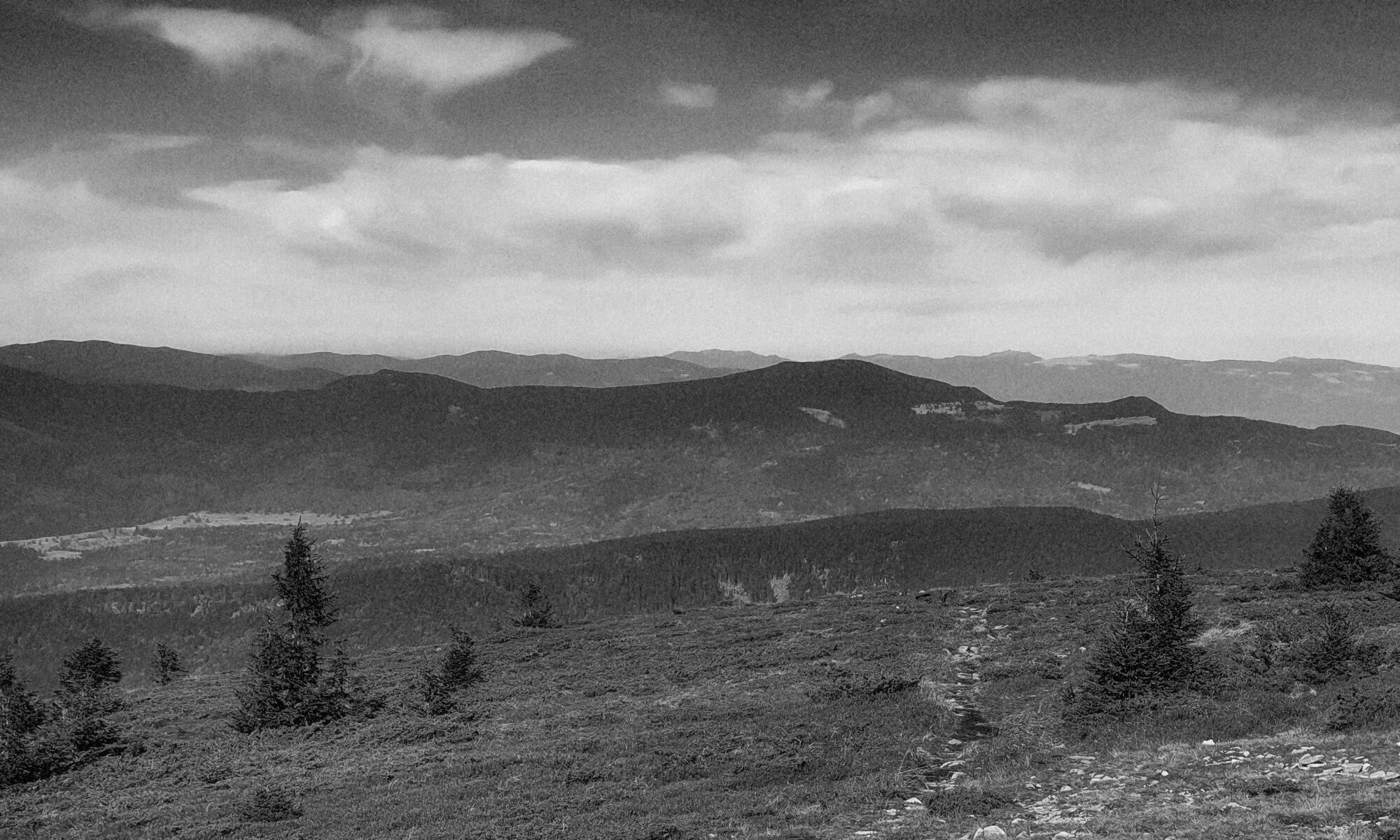THE DARK MOUNTAINS. Between the baths of Harghita and the Mădăraş mountain lodge lie deep black forests, the splendor of the range. They stand like dark parapets, black horizons, shadowy forest fleece, unbroken by clearings, untouched by the woodcutter’s hand. Forest hillslope fens are deserted and desolate, not many people hike the Harghitas. Ridges are grassy, sheep-trampled pastures, and the eighteen-hundred-meter-high peak is blanketed in bog bilberry, juniper, and moss.
Further to the north, the mountain ridges dwindle and lose their dark pall. But they remain trackless until reaching the neighboring Gurghius. Stones here are dark, too – testimony to the volcanic activity that formed this Carpathian belt.
The baths of Harghita are surreal. Lost amid mountains and forests, they undoubtedly remember better days. I climbed out of the valley with the mists of evening, and what I saw seemed dismal and strange. Ivory sentinels stood guard, kaolin mountains, from which water streamed into viscous alabaster lakes where the full moon shone. To and fro along muddy forest tracks, bristly old men and wide-hipped grandmothers hobbled toward rust-colored springs where they set about exuberantly healing their ills. Many headed straight for two tiny shacks that had been erected upon a muddy meadow. I peeked in. By the light of a kerosene lamp, people in hats and headscarves sat within a dry pit, dug stairwise into the ground, sighing and groaning with relief. The stench of sulfur permeated the shed, fumes that emanated from the depths of the earth. That, I imagined, is how a medieval plague pit must have smelled. The Harghita baths have no resident doctor, the grubby man I took to be a shepherd was, in fact, the facility’s administrator. Everyone there spoke Hungarian, their Romanian was not very good. The Harghitas are home to more Székelys, Romanian Magyars, than ethnic Romanians. Children in the baths greeted me with the unfamiliar word “choklom,” and when I responded in Romanian, they ran timidly away. The last building at the forest’s edge was a small wooden church with an organ. Hungarian all, inside and out. Not a Romanian word to be seen.
Further to the north, the mountain ridges dwindle and lose their dark pall. But they remain trackless until reaching the neighboring Gurghius. Stones here are dark, too – testimony to the volcanic activity that formed this Carpathian belt.
The baths of Harghita are surreal. Lost amid mountains and forests, they undoubtedly remember better days. I climbed out of the valley with the mists of evening, and what I saw seemed dismal and strange. Ivory sentinels stood guard, kaolin mountains, from which water streamed into viscous alabaster lakes where the full moon shone. To and fro along muddy forest tracks, bristly old men and wide-hipped grandmothers hobbled toward rust-colored springs where they set about exuberantly healing their ills. Many headed straight for two tiny shacks that had been erected upon a muddy meadow. I peeked in. By the light of a kerosene lamp, people in hats and headscarves sat within a dry pit, dug stairwise into the ground, sighing and groaning with relief. The stench of sulfur permeated the shed, fumes that emanated from the depths of the earth. That, I imagined, is how a medieval plague pit must have smelled. The Harghita baths have no resident doctor, the grubby man I took to be a shepherd was, in fact, the facility’s administrator. Everyone there spoke Hungarian, their Romanian was not very good. The Harghitas are home to more Székelys, Romanian Magyars, than ethnic Romanians. Children in the baths greeted me with the unfamiliar word “choklom,” and when I responded in Romanian, they ran timidly away. The last building at the forest’s edge was a small wooden church with an organ. Hungarian all, inside and out. Not a Romanian word to be seen.
